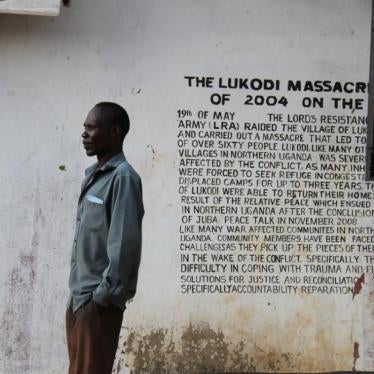The latest effort to win exemption for U.S. nationals from the international criminal court has not succeeded. In three weeks of negotiations concluding today at the United Nations, the U.S. delegation tried to restrict the power of the court to request the surrender of suspects. In a June 23 debate on the U.S. proposal, 39 delegations opposed it, out of 45 who took the floor. Only Israel and Turkey fully supported the U.S. text.
The delegates did agree to include a new provision aimed at keeping Washington engaged in talks on the court. Human Rights Watch warned that this new provision may encourage Washington to press even more intensely for special exemptions at the next round of talks on the war crimes court, set for November 2000.
"Completing this round of talks is a big step toward making the court a reality," said Richard Dicker, counsel to Human Rights Watch and the director of its campaign for the international criminal court. "I'm happy to say that the U.S. effort to undermine the court has failed, at least for now. But governments will have to prepare for another assault in November."
The U.S. efforts were focused on Article 98(2) of the treaty, which already (due to U.S. insistence in Rome) will prevent the court from prosecuting troops stationed abroad when they are accused of serious human rights crimes. The U.S. sought to enlarge that exception, to allow all kinds of agreements - between the court and individual states, between the court and military alliances like NATO, between the court and regional organizations, and most importantly, between the court and the United Nations - to confer special exemptions.
"The U.S. proposal would have made the court vulnerable to pressure from all sides, which would undoubtedly weaken its authority," said Dicker. "It's important that Washington's demands for special treatment must not undermine the impartiality and effectiveness of this court."
Dicker said that Washington's lobbying was unnecessary because the treaty already provided numerous safeguards against politically-motivated prosecutions.
The talks this month achieved a major milestone: completing both the court's "rules of procedure and evidence" and the "elements of crimes." Completing these subsidiary agreements is expected to accelerate ratification of the treaty establishing the court. Thirteen states have ratified so far; Germany and Canada are expected ratify soon. The court will be established once 60 states have ratified.
The treaty for the international criminal court was finalized in Rome in July 1998. Only seven countries, including the United States, Iraq, and China, voted against the treaty at that time, while 120 countries voted in favor. The international criminal court will prosecute genocide, crimes against humanity, and war crimes. It is considered one of the most important advances in human rights protection in decades.
In the negotiations on "elements of crimes," Egypt and China also mounted full-scale efforts to roll back parts of the treaty. They insisted that a state must have "actively encouraged" a crime in order for the court to prosecute a suspect. For crimes where the state turns a blind eye to abuse rather than encouraging it actively, the court will now have less room to maneuver. But a footnote to the new provision would allow the court to intervene in "exceptional circumstances."
|
News Release
U.S. Thwarted in Effort to Weaken War Crimes Court
Your tax deductible gift can help stop human rights violations and save lives around the world.
Region / Country
Most Viewed
-

-
November 25, 2019
A Dirty Investment

-
April 27, 2021
A Threshold Crossed

-
February 20, 2026
Abuses in Cameroon After US Deports Third-Country Nationals

-
January 23, 2018
Hidden Chains


